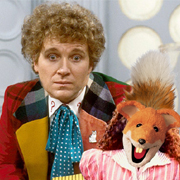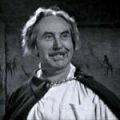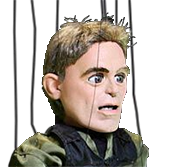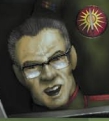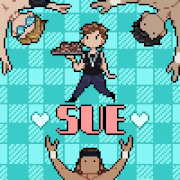|
Astroman posted:RTD's motives here remind me of Moffat's well meaning but misguided idea of showing medieval British villages as full of black and brown people "because that's what Britain looks like today and modern British people should feel represented". It sounds good, until you imagine him saying "Modern Beijing is very cosmopolitan and full of people from all over the world, so let's do a episode about 14th Century China where a bunch of white people are walking around." Or perhaps more problematically, "whitewashing history" in the sense that it says "many modern white British people are tolerant and live in harmony with minorities, and they were that way 800 years ago too." It sounds good until you change what he's saying and the context of what's happening Astroman posted:So British people just kinda became racist for a bit when they were colonizing India, Africa, and the Americas? That is covering up some elements of history that need to be known. That's more true than false, tbh - much modern racism has its roots in slavery, the attempt to justify it morally by defining black africans as sub-human. I'd personally argue that showing a multicultural society and not drawing attention to it is not saying that this is how the world is and it's not inherently a glorification of current society. Why can't it be aspirational, why can't it be a part of bringing that society about by showing it as normal? Star Trek didn't make a song and dance about Nichols being a regular member of the bridge crew in the 60s, for example.
|
|
|
|

|
| # ? Jun 6, 2024 14:27 |
|
History is full of the worst people doing the most godawful things for the shittiest imaginable reasons. Doctor Who is not educational, it isn't about teaching us how life used to be in some place and time. It would be a very grim and bitter show if it were a real tour of history.
|
|
|
|
|
That's a very cynical view of history. Good things happened too.
|
|
|
|
MrL_JaKiri posted:It sounds good until you change what he's saying and the context of what's happening I'm glad you picked up on this, because I read that bit and went, "wait, what the gently caress?" but there were already a lot of posts afterwards and and I felt hesitant about trying to dredge it back up. MrL_JaKiri posted:That's more true than false, tbh - much modern racism has its roots in slavery, the attempt to justify it morally by defining black africans as sub-human. Two distinct and very good points. Medieval Britain was probably not chock full of people of color, but nor was it lily-white, either. People moved around a lot more than you might expect. I'm a lot more familiar with Rome than Britain (and obviously Rome was closer to areas with Black people) but we've found the skeleton of a Japanese man buried in a Roman graveyard. And the Roman Empire, while xenophobic in other ways, didn't make much of a big deal about skin color. If you were a Roman citizen, you were a-ok, and if you weren't you could piss off. ...and even if that wasn't the case, the fact is is that modern Britain is a diverse country with lots of different people and refusing to cast those people in an episode set in the past is depriving them of potential jobs, and it ought to be okay to bend history a little bit in the same way that it's okay to bend history by having them speak modern English.
|
|
|
|
Khanstant posted:History is full of the worst people doing the most godawful things for the shittiest imaginable reasons. Doctor Who is not educational, it isn't about teaching us how life used to be in some place and time. It would be a very grim and bitter show if it were a real tour of history. It's got a good number of those, but that's because there's a lot of history. The vast majority of people have always lived boring, ordinary lives and attempting to paint all of history as being some crimes-against-humanity-fest has largely been pushed not by historians but by edgelords who want to justify their lovely predilections by justifying it through "historical accuracy"
|
|
|
|
https://www.youtube.com/watch?v=U0ZxB_0z4X0
|
|
|
|
Another audio, this time dipping into The Early Adventures range with The Sontarans. Interestingly, this is meant to be the Doctor's first encounter with the Sontarans, slotting into the narrative gap in The Daleks Master Plan. The Sontarans are a fun race of villains, but tend to be played too much for comedy recently - while there is humour in the miltary pomp, this audio treats the Sontarans fairly seriously. The Early Adventures is meant to feel like reconstructions of missing episodes - full cast, but with narration. You can imagine these being stitched together with telesnaps, crude animation and surviving clips, the atmosphere is so spot on. There's some great imagery of the Sontarans fighting on a lava filled asteroid, especially a scene where they dive bomb into the firey magma to ambush the humans - you can imagine them coming out of the pools (if this was a real missing episode, I suspect the clip would have survived due to being cut by overseas censors!). Peter Purves, Jean Marsh and Dan Starkey are on fine form here.
|
|
|
|
Honestly diverse casting for period pieces also seems to me like just a matter of equal opportunity employment. Even if you end up with some specific place and time where a large majority of the people were white it still sucks to tell all the nonwhite actors they shouldn’t bother auditioning. And while DW has been able to occasionally do something like Demons of the Punjab, it’s a British show, they’re more likely to be able to scrape together resources for historicals set in Europe or the UK. So you may as well risk casting a few more black people than you necessarily would have seen in 1600s Shropshire or whatever. I also want to bring up a point about Rosa, I think it was important that the villainous white supremacist came from the far future because it’s kind of a fallacy to assume racism will inevitably die out. The last decade-and-change has been a reminder of how deeply entrenched these attitudes are and you can’t always assume progress will be forward. At the same time he was clearly taking extreme measures because he was on the losing side, so the idea that his origin makes Parks’ struggle seem futile is not something I can agree with.
|
|
|
|
On the other hand it's kind of bleak that it's apparently easier to imagine time travelling klansmen than it is to imagine racism being behind us
|
|
|
|
Open Source Idiom posted:Ignorant poo poo I'm an insufferable SJW and you're terribly ignorant. Have more empathy and listen to more and different people. End of argument. (USER WAS PUT ON PROBATION FOR THIS POST)
|
|
|
|
Dabir posted:On the other hand it's kind of bleak that it's apparently easier to imagine time travelling klansmen than it is to imagine racism being behind us True, but there are likely weirdos today who are still salty over things like Prussia not being a free state anymore or someone who, given the opportunity, would travel back in time to prevent the fall of the Qing Dynasty. Doesn't mean those ideas have the kind of institutional and cultural framework supporting them that modern white supremacy does.
|
|
|
|
LividLiquid posted:Buddy, you definitely don't want to get into this with me and this thread is usually very nice and doesn't deserve to have to witness me to doing my thing again. We're on the same side, take your own advice about having more empathy and chill the gently caress out.
|
|
|
|
Open Source Idiom posted:But I guess the composition of (some) real world fascist organisations have changed with the times and their metaphorical versions might change as well. But it still strikes me as a little wrong. loving Ernst Röhm was head of the SA (Brown Shirts) and one of Hitler's closest allies while being homosexual. He was later murdered by the party during the Night of the Long Knives. So yeah a fascist organization can have members you wouldn't traditionally think of belonging when you're talking about early days of a regime. Edit: Fascist organizations are typically more lenient in their early stages to creep into power before amassing enough that they can exert their true political will. jisforjosh fucked around with this message at 03:43 on Nov 21, 2023 |
|
|
|
jisforjosh posted:loving Ernst Röhm was head of the SA (Brown Shirts) and one of Hitler's closest allies while being homosexual. He was later murdered by the party during the Night of the Long Knives. So yeah a fascist organization can have members you wouldn't traditionally think of belonging when you're talking about early days of a regime. Totally, though I believe by the time Davros was around the Kaleds were heavily invested in their purity regime -- generationally so -- so it's not early stages for them. Davros is significant among the Kaled elite because he still retained visibility and power among his peers despite their desire to exterminate him. He was just too essential to the war effort, and it's that ambivalence that's central to his circumstances. If you cast POC as members of Kaled high command (which is, yes, positive since you improve the lives of real life people of colour) you lose that subtext and end up suggesting a different sort of story, and you end up running into conflict between positive impulse (jobs and visibility for minorities!) and a fraught message (Nazism isn't about white supremacy!) I think the solution is pretty obvious though -- tell a different story, one that's not centred on space Nazis in the same way this short is. This allows you to retain the jobs and visibility. Open Source Idiom fucked around with this message at 04:16 on Nov 21, 2023 |
|
|
|
I think that the current Tory leadership is more than enough evidence that fascism can successfully incorporate POC leadership even when that leadership is espousing racist and white supremacist attitudes.
|
|
|
|
Can't believe we're so close to new doctor who! Trying to think of a few episodes to watch this week before hand and so far my list is Runaway bride Partners in crime Turn left Journeys end The day of the doctor Also I listened to the first I davros and like everybody here said it is pretty good!
|
|
|
|
Confusedslight posted:Can't believe we're so close to new doctor who! Trying to think of a few episodes to watch this week before hand and so far my list is Oh wow, we are a week out! And for the first time in, no lie, a decade I will be off work for the holidays - with no actual plans the day(s) off. It's time to start nerding out - great call. I'm definitely going to do Partners in crime, turn left, day of the doctor.. And voyage of the damned I know it's not the highest regarded ep(or involving Donna - but neither does Dotd) , but some reason it sticks out of the nostalgic 10 episode to me Edit maybe it was minogue making me enjoy it. She is in a French maid outfit the entire time iirc
|
|
|
|
Season 11 New Year's Special: Resolution Written by Chris Chibnall, Directed by Wayne Yip Ryan Sinclair posted:Short version: Alien psychopath, in its own tank. The benefit of hindsight is a wonderful thing. Doing the bulk of these write-ups after the Chibnall era ended there is valuable knowledge about where things would eventually go, what angles and twists and developments would pay off and which would not for example. It also gives a sense of where (subjectively) each episode effectively ranks against the other, which aged well, which were good (or bad) in the moment and which stood the test of time. Happily, this episode is one of the latter in my opinion. It was good when it first aired, it's still good now, and it ranks among the best of the entire Chibnall/Whittaker run. It's also, and I don't give a poo poo what the DVD releases say, clearly part of Season 11! It's called Resolution for God's sakes! That's exactly what it is, beyond the obvious nod to airing on New Year's Day. It is a far more effective wrap up to the season than The Battle of Ranskoor Av Kolos (such a dumb name), it gives some degree of closure to a major plot beat introduced in The Woman Who Fell to Earth for Ryan as a character, demonstrates the now fully developed relationship between the Doctor and her new companions, and perhaps most notably is the first story of Whittaker's run where we get to see her face off with a regularly recurring "monster" from the show's history. Chibnall's idea, like so many of his were, had a good and positive foundation regardless of how well they ended up being executed: he wanted somewhat of a fresh start for his Doctor, and deliberately chose to do a first season that didn't feature old monsters, old characters, old locations etc. It was Sheffield instead of London, there was no UNIT, Stenza instead of Cybermen, different time periods, different galactic empires etc. He didn't want the show to feel like it was relying on the old and familiar, but was developing and growing in new ways. Sometimes this worked, sometimes (distressingly, often) it didn't, but it was a reasonable idea. The trouble being, of course, that a lot of these familiar characters, monsters, locations, empires etc are a part and parcel of the Doctor Who experience. They don't need to ALWAYS be there, but neither is it reasonable for them to NEVER be there. There was a sense of this run of Doctor Who was oddly distinct from all others, like other than the TARDIS and the Doctor it didn't really feel like it was a part of the pre-established history of the show. That clearly wasn't the intent (that would be mad!), but the absence of certain familiar beats couldn't help but stand out. And that's part of why this episode felt like it was making it clear,"Okay, we've done what we wanted with the first season, let's cap it off with a reminder that yes, all that other stuff is still there and just waiting to be encountered." What better way to do that than with a genocidal pepper-pot!?!  Way back in December of 1963, the second ever Doctor Who story was called The Daleks. Sydney Newman had told Verity Lambert he wanted the show to alternate between educational historicals and futuristic sci-fi stories (that also explored educational ideas, albeit through a fantastical lens, not just an excuse for "bug-eyed monsters"!), an idea that didn't take all that long to fall by the wayside as the sci-fi stories clearly generated far more interest (I do lament the loss of the pure historical). Newman, not a fan of "bug-eyed monsters", couldn't deny that The Daleks (episode AND creatures) were a phenomenon. The audience across the 6 weeks the story ran rose by millions, children eagerly played Daleks in the street and on the playground, merchandise was everywhere, they even made two Doctor Who movies with Peter Cushing! For the following decades that Doctor Who was running, the Daleks were a near constant experience, sometimes disappearing for a little while but ALWAYS returning, their absences usually a result of Terry Nation exploring attempts to make them their own standalone show/movie. The thing was, the Daleks were a part and parcel of Doctor Who, neither felt quite complete without the other. So the Daleks always returned to Doctor Who, and while certainly not every story was a classic, even the worst of them had those terrifying voices, that inhuman "eye", the utter fear that was felt by their victims. When the show was revived in 2005, one of the first questions asked was would the Daleks appear? They did, in one of those "classic" stories, where it was suggested perhaps this Dalek was the LAST Dalek. They returned of course, and would continue to return, to the point that rumors continue to persist that part of the licensing agreement with the Nation Estate is that there must be at least one Dalek appearance every season (or year of specials). All of which is a long-winded way of saying that this episode has a Dalek in it, and it's both a welcome surprise and also not a surprise at all! I can't say it's a "classic" Dalek episode, but it is a very good one, and while it is the old and the familiar returning to a season of Doctor Who designed to be new and fresh, it also offers a very interesting twist on the classic Dalek episode structure, one that just further demonstrates not just how scarily resourceful a Dalek can be, but how utterly cruel and monstrous they are. There is even a twist on the classic design, one that makes sense as a one-off (the design would appear again, with a reasonable explanation, but it didn't work anywhere near as well the second time) as well as a twisted take on the Doctor. Her engineering of a new Sonic Screwdriver from what parts she could scavenge in The Woman Who Fell to Earth (another idea we can see was largely forgotten/abandoned with the benefit of hindsight) is mirrored in a sense as "Lin" builds a Dalek shell from scavenged and recovered parts, yet another example of the way the Doctor and the Daleks are (much to both their chagrin) seemingly forever connected. Jodie Whittaker finally gets a chance as the Doctor to face off with a Dalek, and she nails it. There is a brief prior scene of her communicating with the mutant through holographic projection which is solid, but late in the episode when she and the Dalek share a scene together is one of the sadly too few times that she really gets to have a classic Doctor moment. The Dalek represents the antithesis of the Doctor as a character, and she takes the opportunity afforded by the built-in history that simply wasn't there for the likes of the Stenza to clash with the monster over the wrongness of its philosophy, of her belief in humanity, and gets a wonderful moment where she reveals her identity to the Dalek and it recoils in horror and alarm as it realizes it has come face to eyestalk with the boogeyman.   The episode itself is far from being perfect, and indeed many of the issues it has are ones that once again the benefit of hindsight shows us were staples of the Chibnall era. It is certainly more effective at the parts it gets right, but it's an overstuffed episode that has too much in it while simultaneously not giving all the characters enough to do. The character who suffers the most from this is, once again, Yaz, with Mandip Gill again suffering for the fact her character is not a showy one. It's a fine thing to try and demonstrate a police officer character as actually focusing on the less visible elements of police work: she talks with people, she spots when they are overwhelmed or upset, she figures out how to coax more information out of people etc. But it also means that she is largely relegated to the background, while Graham and in particular Ryan get a lot more meat to work with through their shared family history and the appearance of Ryan's father at long last. What makes this stand out the most is that a key point in the story features "Lin" being pulled over by police, the Kaled mutant gleefully using this as an opportunity for "combat". Two police officers are murdered, something you would think would cause a massive reaction from the police force which in turn would pull in Yaz (or that she would be understandably upset/shocked when she discovered what had happened), except... it apparently happens in complete isolation from the rest of the story. The deaths are never mentioned or have any further impact on the story, the moment they're off-screen they cease to exist, in much the same way the wiping out of a military unit later in the episode also apparently happens completely in isolation with no impact, the military just... not bothering to send any more units or showing alarm over an attack. Part of the reason for this is that there are too many characters, too much going on, and Yaz ends up having no space. What's the alternative here, given all three companions have to be present for the story (this was a common problem in the Davison era, where they would frequently just leave one of the companions in the TARDIS or otherwise isolated)? Maybe Yaz could be the victim of the Kaled Mutant, giving the attempts to free her a more personal stake for the Doctor, Ryan and Graham? That would certainly give the scene with the officers being murdered higher stakes, given she'd have to deal with that guilt afterwards even knowing that she wasn't responsible. She could have used her police training to try and talk the Kaled mutant down, which would fail to convince it but would perhaps serve to infuriate it as she poked holes in its revolting "logic" of supremacy? It's an idea, but not necessarily a good one, just an alternative to Yaz effectively doing nothing. The Doctor doesn't NEED a personal stake to want to save the Dalek's victim, and while it kind of sucks for Mandip Gill to be a primary cast member but having less to do than a supporting guest cast member, I wouldn't want to lose Charlotte Ritchie's Lin because she does a tremendous job. Both as the victim Lin AND as the puppeteered body having the Kaled mutant's monstrous will filtered through a human's facial expressions, Ritchie is really, really good. It's also fun seeing her in a role like this, given my familiarity with her is mostly through the very broad comedy of Ghosts.   What the Dalek does to her is horrifying, as well as an entirely new aspect of the Daleks not seen before in any story (that I can recall). Having been trisected and buried in different parts of the world in a frankly kind of awful opening segment (why is there a narrator? Who is narrating? Do the other two members of the centuries old pact just kind of shrug and gently caress off when the thing their order has been guarding for centuries disappears?), part of the mutant is rediscovered by Lin and her colleague (and sorta-kinda-maybe boyfriend) in an archeological dig and accidentally revived. Reuniting its component parts (this ability is put down to its status as an "enhanced" Scout, one of the first to ever leave Skaro after the Daleks discovered space - and time! - travel were possible), the mutant latches itself onto Lin's body, takes control of her body and brain and puppeteers her through its pursuit of whatever existing Dalek technology it can find so it can restore itself and contact the Dalek fleet. That's horrific enough, but what makes it more so is the sheer cruelty and sadistic pleasure it takes in what it is doing. It needs Lin alive while it moves her about, but it also makes certain that she knows what it is doing, that she is constantly aware of what is happening to her and what it is making her body do. Its hatred and contempt leaks through into her facial expressions, leaving her unsure where it starts and she ends, and it makes a point of murdering even when it doesn't have to, even when she could talk her way out of situations. It's a scout, intelligent and dangerous but also designed for recon, and the fact it forgoes subtlety for blatant murder is both a reminder of how alien the Daleks are and also how violently they react to anything that challenges their own perception of their so-called superiority. This Dalek was humiliated, it might have taken 3 armies (no explanation of how all three came together from such different parts of the world in the 9th Century) but it was defeated, trisected, and its parts buried in the ground for centuries. Now it is out, and it means to humiliate Lin, to revel in murder, to take savage satisfaction from teaching these humans a lesson for daring to make it question its own bred in belief that it is superior form of life. There's a moment in particular that really stands out. The Doctor has used techno-babble to force a holographic face-to-face confrontation with "Lin", which she also uses as a way to both goad the Dalek while also getting through to Lin and offering her a sense of hope. As she and the Dalek verbally joust, she talks up humanity's strength and demands it free Lin, and a horrible, hacking, gurgling noise emerges from "Lin". The Doctor is as confused as anybody, but believes she knows what she is hearing, as horrifying as it is. The Dalek is laughing. That's one of the horrifying things about them. Even laughter is monstrous. There is no joy in its laughter, no humor, no happiness. It is cruel, full of contempt, and clearly something that Daleks do not usually do. "DALEKS DO NOT LAUGH!" is a line you might expect to hear in an episode at some point, and of course they don't, because laughter SHOULD mean having some kind of soul, some kind of joy for the world. Cruel laughter, laughter that punches down, that mocks or taunts purely out of contempt, is pointless and mean and nasty. But even that at least sounds human. Laughter from a Dalek is an abomination, the sounds having to be forced out as an approximation, potentially only possible at all because they can be filtered through Lin's human body and the mutant's presence in her mind allows it to follow neural pathways either long since atrophied in its own if not outright expunged from the early days of Davros' experiments. As mentioned earlier, this is one of the sadly few episodes where the Doctor actually gets a chance to be proactive, to demonstrate her intelligence and the fact that she's very, very, very clever. Confronting the Dalek through the holographic projection was a multi-faceted move on her part, getting her location data, giving her a chance to figure out exactly what and where this specific Dalek's origins were, but also to offer Lin hope. That pays off after the recreation of the Dalek shell, as Lin grasps that puppeteering her body is taking as much out of the mutant as it is out of her... in fact more. It is the mutant that is weakening, that desperately needs to get inside this approximation of its life-support shell to regain both its formidable weaponry but also its strength. She fights it off body and mind, and thus ends up saving herself. This will go a long way to helping her recover (which will be a LOOOONG road, one largely glossed over by the story with her and Mitch seemingly ready to just move on with their lives), because she wasn't used and discarded, she was used but fought back and freed herself, presumably a massive psychological lift for her sense of self. But all of that, while the main plotline of the story, is also accompanied by a pretty massive subplot that builds into the climax. Its both a strength and weakness of the episode, because Tosin Cole in particular gets a lot to chew on as Ryan's father finally shows up after failing to appear at Grace's funeral, with Bradley Walsh also getting some strong moments in his role in this plot, but it's vying for time with the pretty massive events of the main plot. That Chibnall is actually able to write Ryan's dad - Aaron - with some degree of sympathy given how primed we are to dislike him, to allow some time for a couple of strong scenes between Ryan and Aaron as well as Graham and Aaron, is to his credit. Tying it in with the climax of the episode (even if Chekov's microwave is a bit silly) also works well, but it does make for a very packed episode, with Yaz the innocent bystander mowed down by all these other actors having something to do.  Graham's initial reaction to Aaron's appearance could be played for comedy, but it works because there is every reason for him to see this man on his doorstep and just shut the door in his face. Aaron has been an absent father for Ryan, was an absent son for Grace, and now while all these important and pivotal things are happening, he shows up on the doorstep having decided the time now suits him to appear? But Graham is also a good person, and it is to his credit that he isn't overly upset by Ryan's willingness to talk to Aaron, and that in fact later in the episode when unexpectedly left behind with him in the house, he doesn't just sit in silence, he doesn't just talk, but he takes active steps to try and understand Aaron's point of view as well as showcase to him just how important his status as a parent is, how much Grace loved him and how Aaron has a chance now to try and make up for lost time. Graham has been through a lot in this season, in the two previous episodes in particular, and it demonstrates real growth that his exposure to the Doctor has made him understand the importance of forgiveness and second chances. Similarly, Ryan gets a strong scene where he and Aaron go to a cafe and Ryan gets to unload on Aaron his frustrations over being abandoned by him. Aaron doesn't have some grand excuse, some secret reason why he had no choice, even if there were things that happened that hurt him badly too. He handled those badly, he ran away, he looked to work in Engineering and on oil rigs, and none of it justifies being a bad father, but he can at least admit - after a pathetic token effort to criticize Ryan for being disrespectful - that he's ashamed of his actions. Things get a little muddied after that as the main plot overtakes things (aside from Graham and Aaron having a proper chat where Graham finally gets an explanation for why Aaron didn't attend Grace's funeral), and Aaron's inclusion in the TARDIS smacks a little too much of just needing him in there for the big emotional climactic moment as well as Chekov's microwave. It isn't entirely clear how Ryan feels about Aaron at this point, he's heard him out and seems to be getting along reasonably okay, but mentions to Yaz that he still doesn't want him around at all. Of course, Aaron being put in peril gives Ryan the emotional push he needs to set aside animosity to reach out figuratively and literally to his father, but while the scenes mentioned above do some strong groundwork for rebuilding a relationship, it feels like they take a shortcut to get to where they end up by the episode's finish, particularly since - again with the benefit of context - Daniel Adegboyega never shows up as Aaron ever again, and unless I've forgotten something never actually gets mentioned again at any point? Making the entire thing feel, not pointless certainly, but also kind of vestigial. There's some lighthearted attempts at comedy that would probably have passed a little easier or held up better if this was the typical Christmas special which tend to be broader in terms of comedy beats than regular episodes, but New Year's doesn't really have quite the same festive spirit going for it. There's a Brexit (never directly referenced) joke about the disbanding of UNIT due to Britain's international partners not feeling like footing the bill for an organization invented in the show as a nod to the European Union, which would be a pretty ignominious (and cruel) end to decades of show history if that benefit of hindsight didn't show that UNIT and Kate Stewart got a chance to shine again later. A crack about the Internet going down leads to a double-shot of jokes about how monstrous an act that is to do on New Year's Day which are amusing (if groanworthy) enough in the moment but kind of clash with the tone of the episode at that point - presumably they were intended as a tension breaker? But isn't this where the tension should be at its highest? Again, it might work at Christmas, not necessarily on New Year's. Working with her "fam", the Doctor prevents the Dalek from using GCHQ to contact the Dalek fleet, and destroys the Dalek Shell (remember, it's got Dalek parts/technology but is also made up of scrap parts to complete it), seemingly killing the Dalek. The mutant has escaped however and takes over Aaron's body, demanding the Doctor take it in the TARDIS to reunite with the fleet. The Doctor is seemingly gullible enough to take it at its word that it will release Aaron afterwards, but happily this was just her playing on the Dalek's own belief in her inferiority, as she instead drops them next to a supenova and cracks open a tiny portion of the TARDIS force-field to rip it off Aaron. She hasn't accounted fully for its sheer hatred however, because as much as the Doctor and the Daleks know each other, they can never TRULY know what it is like to feel as the other does. There is no gain from taking Aaron with it, and though it might calculate there is a chance the Doctor will relent and close the TARDIS doors, its primary thought is likely that it will at least kill something "inferior" as it goes, one last spit of defiance at the university purely for its own sake. It's Ryan reaching out figuratively and literally to his father that saves him, giving him the strength - like the Doctor gave to Lin earlier, along with the presence of Mitch - to hold out against the overwhelming hatred of the mutant. The Dalek is torn free and sucked into the supernova, burned down to the atoms, disintegrated, and this time there would be nothing for archeologists to find centuries down the line.   We'll get to Revolution of the Daleks at the end of Season 12 After an over-packed episode, the wrap-up is rather abrupt. Aaron turns down an offer from the Doctor to come along for a ride on their next trip, Ryan and Aaron hug and then... that's that. We never see Aaron again, Lin and Mitch get maybe one line to wrap up their story (to be fair, Lin got a hefty chunk of the episode), the murders of the police officers and the wiping out of a British military unit on British soil go unmentioned, and the Doctor her and companions just head off on another adventure. This sounds like a negative, but really despite some flaws this was a really, really strong episode and one that showcased some of the promise that the show still had at this point. With the benefit of hindsight, for me Season 12 - which has some great moments and episodes, don't get me wrong! - starts seeing the tipping point for the Chibnall era being something that I could see promise in to something I saw as both promise squandered as well as some pointlessly stupid and bad decisions that would ultimately go absolutely nowhere. None of that changed my opinion that Jodie Whittaker was inspired casting and she was giving her all, but this episodes remains one of the few where she really got a chance to realize that promise. Despite the abrupt ending, the episode ends on a great line. Having started the episode taking the companions on a series of New Year's Days which helped showcase that not every adventure she takes them on is life or death, the episode ends with Yaz asking the Doctor where to next. Her answer is wonderful. "I was thinking... everywhere."  Index of Doctor Who Write-ups for Television Episodes/Big Finish Audio Stories. Jerusalem fucked around with this message at 16:19 on Nov 21, 2023 |
|
|
|
Is it going up on Disney+ the same time as UK broadcast or like an hour later?
|
|
|
|
Oddly it’s not clear. A press release today said it was dropping 1:30PM EST and 11:30AM PST, which clearly contradict each other. If the EST time is correct then it’s dropping as the broadcast starts; if the PST time is correct then it’s an hour later.
|
|
|
|
MrL_JaKiri posted:It sounds good until you change what he's saying and the context of what's happening There’s a definite tension here. Dr Who is not Trek. Who is, amongst other things, a historical educational show, a modern day soap opera, and only relatively occasionally a high concept morality play sci-fi show. That’s part of what makes me eyeroll at the ‘What? Black people? In London!?’ commentary. Yeah. There were black people in London. There was always black people in London, going all the way back to it being Londinium. History, as 12 said to Bill, is a whitewash. Who is as good of a format as any to actually educate people. That was one of the original purposes of the show! That line was a little bit unfair, mind. Like the previous poster said, Racism against black people in it’s modern form often has its roots in transatlantic slavery, as a way of justifying why it’s suddenly ok to subjugate another man when all men are supposed to be made in the image of god. If you go back before that to the 1200s, and ask someone what the difference between the Western Europeans and Africans was, they’d be much more likely to start talking about Christendom versus Islam than skin colour. If you started trotting out 19th century racist ideas about black people, they’d be very confused. Black people as they’d have known them were generally either rich traders or skilled and educated specialist labour sent from Constantinople to help build up Western Europe kingdoms so they can stop the Vikings raiding East. Nobody wrote about Black People particularly because very few people wrote, and the few who did didn't give a poo poo. Like, check out this Knight of the Round Table from a 13th century telling. /https://tf-cmsv2-smithsonianmag-media.s3.amazonaws.com/filer/9e/db/9edb8c4d-980b-42a7-afa9-55e61b92332b/01-16-14-sir-morien.jpg) All the monk who wrote it said was he was 'dark of hair and features'. They didn't write a lot about black people in Britain because no-one particularly gave a poo poo at the time. He was Roman, and Christian, the vikings were Pagan and Germanic. That's what they cared about. Now, a woman who has no husband and didn’t get the recent plague so they must have done it themselves and it’s definitely not because their cat was killing all the mice that went near her house. Or that 6-year-old kid who stole an apple last week. Or that person who owes you a penny. They definitely are all agents of satan and need murdering horribly, immediately, in the name of Jesus Christ. Who definitely went in for that sort of thing. Treks whole thing of ‘we created magic food dispensers and all humanities problems went away, now we just learn the flute and gently caress magic lightbulbs all day’ is cute, but ultimately childish. Who is at it’s best when it has something to say. Like, the episode about Yaz in the partition of India, which I think was 13s run at it’s best, partly because we don’t get taught about that clusterfuck at school. Don’t hide from it. Explore it. Show black people in the 1300s. Have the companion ask. Have the Doctor explain the history of Black people in the UK. Laugh as the your weird uncle has a facebook meltdown. Things like that was one of the whole points of the show!
|
|
|
|
You have massively misunderstood Star Trek if you think the point of it is to show how great life is when you have replicators.
|
|
|
|
DavidCameronsPig posted:There’s a definite tension here. Dr Who is not Trek. Who is, amongst other things, a historical educational show, a modern day soap opera, and only relatively occasionally a high concept morality play sci-fi show. That’s part of what makes me eyeroll at the ‘What? Black people? In London!?’ commentary. Yeah. There were black people in London. There was always black people in London, going all the way back to it being Londinium. History, as 12 said to Bill, is a whitewash. Who is as good of a format as any to actually educate people. That was one of the original purposes of the show! DW stopped being a "historical educational show" the moment the TARDIS materialized on Skaro in the second story. quote:Treks whole thing of ‘we created magic food dispensers and all humanities problems went away, now we just learn the flute and gently caress magic lightbulbs all day’ is cute, but ultimately childish. As was already pointed out, if that's your take on Star Trek, then you completely misunderstood what it's about. ST was often more of the things you claim DW as being than DW was. And that's including both the "historical educational" bit as well as the "soap opera" bit. quote:Who is at it’s best when it has something to say. Like, the episode about Yaz in the partition of India, which I think was 13s run at it’s best, partly because we don’t get taught about that clusterfuck at school. Don’t hide from it. Explore it. Show black people in the 1300s. Have the companion ask. Have the Doctor explain the history of Black people in the UK. Laugh as the your weird uncle has a facebook meltdown. Things like that was one of the whole points of the show! I disagree, primarily because when DW tries to "say something" it's either completely clueless about its chosen subject, overly preachy and earnest to the point of reaching almost radioactive levels of cringe, or so hamfisted in the approach that it winds up relaying almost the complete opposite of the intended message. There are exceptions of course, such as The Happiness Patrol with its anti-conformity message and Seven's anti-violence speech to the snipers, but they're the exceptions that prove the rule. DW should be focused on telling good stories first, and let the teachable moments happen organically.
|
|
|
|
I think fiction should have something to say, but it doesn't have to soap box in order to do so. You can just tell stories that are informed by the historical time, or explore that historical context, without being preachy.
|
|
|
|
The Orville of all series had a really good way of putting it, which was that technology didn't create their utopian society. The fact they were living in a cooperative society is what allowed technology like replicators to spread and end scarcity, whereas in an earlier more primitive time (cough our present day) the tech would have merely been used to prop up existing economic systems and inequalities.
|
|
|
|
Open Source Idiom posted:I think fiction should have something to say, but it doesn't have to soap box in order to do so. You can just tell stories that are informed by the historical time, or explore that historical context, without being preachy. The biggest impact the original series of Star Trek ever had, was putting a black woman on the bridge of the Enterprise, as an well-trained officer, who possessed a highly important job that she was expertly skilled at...and it was presented to an American audience of the 1960s as no big deal. TOS wasn't a perfect series, to be sure (a large part of that being due to Gene Roddenberry being an absolute horndog when it came to the show's depiction of women), but I think it was far more successful when it just showed Uhura and other people of color in prominent positions inside (or outside) of Starfleet, than in the episodes where they tried to preach to the audience, like the one episode where the two aliens were both half-black and half-white, but on different sides of their body, so of course they were super racist towards each other as a result. DW never really had the "no big deal" thing going on when it came to racism or other important social movements of the times, not for a very long time. There were plenty of moments in the latter category where the Doctor or someone made a preachy speech or what have you, but not many of the former.
|
|
|
|
Sydney Bottocks posted:The biggest impact the original series of Star Trek ever had, was putting a black woman on the bridge of the Enterprise, as an well-trained officer, who possessed a highly important job that she was expertly skilled at...and it was presented to an American audience of the 1960s as no big deal. I feel like we're largely agreeing. A lot of 60's Doctor Who did try and casually present diverse futures -- to the point where it's considered a typicality of the Troughton era to have a base staffed by a multinational crew -- but they're nearly always diversely White. A few stories try to talk about race in some way or other e.g. explicitly in The Aztecs, Marco Polo, implicitly in The Ark and a few other stories, but usually to ambiguously useful ends. Mid Troughton would have more PoC guest stars (Enemy of The World, Tomb Of The Cybermen) but also White actors who'd been made up to look non-White (Abominable Snowmen, Tomb again), and of course Troughton's playing Ramón Salamander with a Mexican accent. That said, my experience with Star Trek is that it's heavily morality play based storytelling often bordering on the preachy. e.g. a lot of what I can remember of the two and a bit seasons of Deep Space Nine I've seen are episodes like "Bashir learns about wheelchair accessibility" or "Sisko explores AnPrim society and discovers they are dumb". And a lot of the stories about the Cardassians occupation that are used to allegorically consider various issues concerning colonialism, religious extremism and such. I'm not familiar with the show's original run, but what little I've read about it seems to suggest that the show's always been kind of interested in telling stories like these.
|
|
|
|
Open Source Idiom posted:I feel like we're largely agreeing. A lot of 60's Doctor Who did try and casually present diverse futures -- to the point where it's considered a typicality of the Troughton era to have a base staffed by a multinational crew -- but they're nearly always diversely White. A few stories try to talk about race in some way or other e.g. explicitly in The Aztecs, Marco Polo, implicitly in The Ark and a few other stories, but usually to ambiguously useful ends. Mid Troughton would have more PoC guest stars (Enemy of The World, Tomb Of The Cybermen) but also White actors who'd been made up to look non-White (Abominable Snowmen, Tomb again), and of course Troughton's playing Ramón Salamander with a Mexican accent. Oh yeah, we're mostly on the same page I'd say. DW really didn't start addressing diversity in its main cast until RTD brought the show back, whereas that was part of Star Trek's remit from the beginning.
|
|
|
|
Open Source Idiom posted:Totally, though I believe by the time Davros was around the Kaleds were heavily invested in their purity regime -- generationally so -- so it's not early stages for them. The Kaleds and the Thals appear to be human; if that distinction is the driver of racism on Skaro, then skin color needn't be a thing. For that matter, while there were some non-white Nazis, there are lots of fascist dictators who weren't white, so you can tell as story about fascism and hatred without necessarily placing a restriction. If you want to go after making the message less clear, Genesis of the Daleks can itself be accused of that: Davros and the Kaleds come across as Nazi-like, I think we'd agree. And yet, only some of Davros' hand-picked researchers end up siding with him, while the rest demand the dalek program be shut down. Isn't that sending a clear message of "not all Nazis" and suggesting that plenty of Nazi scientists were OK chaps in the end? Either you admit that the whole analogy was deeply flawed and compromised from the beginning, or you accept that when writing a science-fiction allegory you can't expect a strict one-to-one correspondence in the way you seem to be demanding here. In a broader sense, there is (and quite rightly) grounds for differences of opinion in terms of representation, not just a concern about depicting a Kaled elite as played by a PoC, but even things like Uhura in Star Trek: TOS as either effective representation, or tokenism in service of a futuristic, white and American-centric dominated "Federation" that generously admits to having non-white people around as well as aliens, but has a token "half-human, half-Vulcan" as the only regular alien on the crew, and keeps hammering away at his "mixed race" status. I generally think TOS did more good than harm, but it wasn't alone in taking these brave stances and it didn't always get things right. In my experience working on similar issues of representation, diversity, and their lack, being willing to have the conversations is a minimum starting point. Doctor Who hasn't always been willing to have these conversations. So there's been progress.
|
|
|
|
Narsham posted:If you want to go after making the message less clear, Genesis of the Daleks can itself be accused of that: Davros and the Kaleds come across as Nazi-like, I think we'd agree. And yet, only some of Davros' hand-picked researchers end up siding with him, while the rest demand the dalek program be shut down. Isn't that sending a clear message of "not all Nazis" and suggesting that plenty of Nazi scientists were OK chaps in the end? Either you admit that the whole analogy was deeply flawed and compromised from the beginning, or you accept that when writing a science-fiction allegory you can't expect a strict one-to-one correspondence in the way you seem to be demanding here. It's been a while but I seem to remember that everyone involved were fascists and they basically underwent a violent schism in terms of how they interpreted their fascist doctrine. Just because some scientists didn't support the dalek program doesn't mean they didn't believe in racial purity and the destruction of the Other -- there's a racial purity argument to be made both for the creation of the dalek (it's the ubermensch) and for the destruction of the dalek program (#notmyubermensch). They're all bad, to the point where it's not worth working out who's better or worse. Beyond which, even if we accept that the original presentation is muddled* -- assuming that the "point" of Genesis is to allegorically talk about white supremacists -- why make that presentation worse? But like I said, current fascist organizations can embrace, say, Rishi Sunak so this guy seems fine in those terms. But it does suggest a Kaled ruling class that was less obsessed with the rapacious elimination of the unlike than previously. But this is getting very loving nerdy and mountain/molehill-y here. *Given that it's Terry Nation it probably is. He loved the fascist aesthetic, whether it be the blond, blue eyed hero Thals, or his SSS officers caught in the ambivalence between cool heroism and cold blooded jackboot. I swear bro didn't know if he wanted to gently caress the fascists or make love to them.
|
|
|
|
Narsham posted:In a broader sense, there is (and quite rightly) grounds for differences of opinion in terms of representation, not just a concern about depicting a Kaled elite as played by a PoC, but even things like Uhura in Star Trek: TOS as either effective representation, or tokenism in service of a futuristic, white and American-centric dominated "Federation" The claim that Uhura was a "token" minority on the show is laughable. Dr. Martin Luther King, Jr. himself begged Nichelle Nichols to stay on the show when she was considering leaving it; he told her that Uhura was a positive role model for young black children on American TV, at a time when those role models were few and far between (or, as Whoopi Goldberg said to her mother when seeing Uhura for the first time, "there's a black woman on TV and she ain't no maid"). If one of the key figures of the American Civil Rights movement of the 1960s felt that Uhura was a vital positive image for black Americans, claiming she was just a "token" is wildly misunderstanding the context of the era in which the character was created. Not to mention you are also ignoring several other characters who'd appeared on the show, played by people of color, some of whom were Starfleet officers; indeed, during the episode where Kirk is being court-martialed, his superior officer is played by a black man. Think about that: during the 1960s, the lead white character on a TV show is outranked by a character played by a black actor. That would have been unheard of just five or ten years prior to that episode's airing.
|
|
|
|
Narsham posted:The Kaleds and the Thals appear to be human; if that distinction is the driver of racism on Skaro, then skin color needn't be a thing. For that matter, while there were some non-white Nazis, there are lots of fascist dictators who weren't white, so you can tell as story about fascism and hatred without necessarily placing a restriction. I agree, and think it makes the commentary on fascism and hatred stronger in many ways to have their biases be different. If this alien society exactly aligns with Human Nazi ideology then it applies there is something universal or inevitable about those specific traits being considered undesirable. Whereas the reality is that all the Nazi talk of racial superiority and the like was purely based on what they thought made the best rallying points for their audience.
|
|
|
|
Narsham posted:
In fairness, fascists having internal disagreements that results in backstabbing and murder is entirely appropriate if you're going for a Nazi analogy. The scientists weren't needed any more so they were deemed insufficiently pure and purged.
|
|
|
|
My YouTube suggestions somehow became flooded with "hot takes" and "we need to talk abouts" concerning the 'new' Davros and how it's a sign of how 'woke' the show has become. Or maybe, you know, it's a hell of a lot easier on the actor and more feasible as the stage crew to have Davros walking around instead looking menacing instead of in the travelling machine with hours and hours of makeup, especially in HD? The only things Doctor Who fans hate more than critics is the show itself. CobiWann fucked around with this message at 14:00 on Nov 22, 2023 |
|
|
|
CobiWann posted:Or maybe, you know, it's a hell of a lot easier on the actor and more feasible as the stage crew to have Davros walking around instead looking menacing instead of in the travelling machine with hours and hours of makeup, especially in HD? Considering it's Doctor Who, I think there's going to be plenty of actors who have to deal with extensive make up along with machines with bumpy nodules on them rolling around the sets.
|
|
|
|
If this is the amount of chatter generated by a five minute comedy sketch for charity, we're just going to be walloped by the discussion generated by actual hour long episodes.
|
|
|
|
Clouseau posted:If this is the amount of chatter generated by a five minute comedy sketch for charity, we're just going to be walloped by the discussion generated by actual hour long episodes. I think some of it is the pent up demand to just discuss anything new. Saturday can't get here fast enough, save us Doctor
|
|
|
|
CobiWann posted:My YouTube suggestions somehow became flooded with "hot takes" and "we need to talk abouts" concerning the 'new' Davros and how it's a sign of how 'woke' the show has become. Here's a handy tip that has served me well. If somebody says,"<x> has become too "woke"" then you can safely never listen, acknowledge or care about anything they ever say ever again for the rest of eternity.
|
|
|
|
Heard they're doing a remake of Rip Van Winkle where he gets woke at the end
|
|
|
|

|
| # ? Jun 6, 2024 14:27 |
|
Rochallor posted:Heard they're doing a remake of Rip Van Winkle where he gets woke at the end lol
|
|
|



